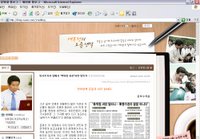Our team blog
This blog is made for assignment of our corse "New Information Technologies"

Now I almost everyday check my blog before checking e-mails. And maybe blogging got a part of my life.
Now what’s your Most Significant Change from your own weblogging?
Sometimes a few words, only one sentence
can encourage you in doing you best,
so I found some famous and inspirational quotes on success for you.
Here are several of them
Colin Powell: There are no secrets to success.
Indira Gandhi: There are two kinds of people, those who do the work
and those who take the credit. Try to be in the first group; there is less
competition there.
Basil King: Victory becomes, to some degree, a state of mind. Knowing
ourselves superior to the anxieties, troubles, and worries which obsess
us, we are superior to them.
James E. Burke: We don't grow unless we take risks. Any successful
company is riddled with failures.
Ralph Half: When ability exceeds ambition, or ambition exceeds ability,
the likelihood of success is limited.
These are not all !
In here you can find more famous and inspirational Quotes on Success
or on other words.
How many types do blogs have?
 Chong Wa Dae (known as The Blue House,
Chong Wa Dae (known as The Blue House,



And added that "blogging is only one of great opportunities that Internet offers us"
Diana posted "Online Journalism in Kazakhstan", too.
She said that Although the Online Journalism in Kazakhstan is growing and Kazakhstani blogging is developing very actively, there is a small number of sites made by Kazakhstan.
"Mostly Astana, Almaty and Karaganda can really be called “all over internet using.” However
we rarely can see any publication in Kazakhstan that hasn’t its online version. For example, Panorama, Khabar, Liter and so on. As a rule the Kazakhstan newspapers and magazines simply put on their sites online versions of printed materials, and for more interactions add forums"
and she introduce two web-sites: first one is blog.kz which is the first blogging site in Kazakhstan & second one is CT- here, news are posted quicker than other media in Kazakhsatn, so many Kazahstany journalists are active in this site.
Finally, I think web-sites and blogs which were made through internet are really changed our society and it help us a lot in all aspects. They give everyone opportunity to do jounalism (like report some useful information) and to do reciprocal process. Kazakhstan, one of developing country, is not yet skillful in IT technology. But I hope the Kazakhstan online system will continue developing more & more!
Thanks for good information to Aliya, Anvar and Diana ;)

